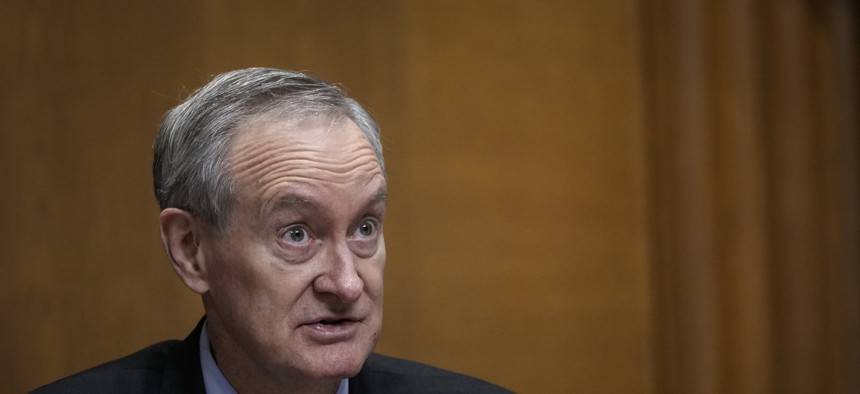Are States and Localities Wasting Their ARPA Funds? Some in Congress Want to Know
By
The Treasury Department is not monitoring if governments are using the recovery money properly, Republican senators charge. They are asking the Government Accounting Office to investigate

[Image: Sen. Mike Crapo of Idaho Getty Images]
"Senate Republicans are concerned that some of the $350 billion in American Rescue Plan Act funds for states and local governments is being wasted, and this week, they asked the Government Accounting Office to investigate.
Fourteen Republicans on the Senate Finance Committee wrote the GAO saying there has not been enough congressional oversight of how the money is being used, and that the Treasury Department hasn’t made available detailed information as to whether states and localities are properly reporting how they’re using the money.
The lawmakers cited a Fortune report that said some of the ARPA money is going for “questionable uses,” including: $12 million for renovations of a minor league baseball stadium; $5 million for paying off debts of the Edward M. Kennedy Institute for the U.S. Senate; $70 million for tourism marketing in Puerto Rico; $6.6 million to replace irrigation systems at two golf courses; $2.5 million to hire new parking enforcement officers in Washington, D.C.; and $2 million for a county to help purchase a privately owned ski area.
========================================================================
INSERT: The City of Mesa has dubious plans to purchase 111 West Main Street, a building that was in foreclosure and vacant for many years.
The site was once the location for ZENO's Cooperative Mercantile and Manufacturer in 1890. ZENO, a character form the Book of Mormon of the Church of Jesus Christ of Latter Day Saints, was an early, and brief, name for Mesa. . .Like Lehi, Mesa also valued common wealth for the common good. An adobe schoolhouse was built in 1882 and The Zenos Cooperative Mercantile and Manufacturing Institution store by 1884. The 300 residents incorporated a city government in 1883.
Early Mesa pictured about 1883 shows the A. F. Macdonald home and gardens at lower left and at right the “relief society hall” (bishops storehouse? with flat roof), a hotel and store (on corner) and new city hall and jail (pitched roof). Macdonald, Mormon Stake President and first mayor, was sent to Mesa from Utah to iron out difficulties. He left in January 1885 to establish a colony in Mexico.
Mesa to move on downtown business incubator
The state’s next big chip maker may get its start in downtown Mesa if City Council approves a new economic development project.
Potato chip maker, that is.
The city is planning to move forward on a partnership with economic development nonprofit First Local Arizona to open a food business incubator at 111 W. Main St. in Mesa.
The vacant building is next to the Nile Theater and once housed a Catholic Books and Gifts store. The “Newsboy” statue stands on the sidewalk in front of the building.
 Mesa’s Downtown Transformation Manager Jeff McVay is slated and will ask Mesa City Council tomorrow, May 16, to approve a purchase of the property for $1.6 million.
Mesa’s Downtown Transformation Manager Jeff McVay is slated and will ask Mesa City Council tomorrow, May 16, to approve a purchase of the property for $1.6 million.
At a discussion session last week, McVay said the city will use American Rescue Plan Act funds to buy the property and renovate the building. The city estimates the total cost of the project, including the purchase and remodeling, will be $3 to $3.5 million.
 The city plans to have the space ready in a year to a year-and-a-half, at which point the city will lease the building to Local First Arizona and let the organization manage the incubator.
The city plans to have the space ready in a year to a year-and-a-half, at which point the city will lease the building to Local First Arizona and let the organization manage the incubator.
The idea is to provide new food businesses based in Mesa, such as restaurants, caterers or food manufacturers, with a commercial kitchen, classes and other resources for growing their companies. . ."
========================================================================
A Route Fifty examination found that while the funds are being used for a variety of Covid-19-related reasons, including replacing lost funds during the pandemic and addressing health and housing issues, money has also been used for such things as building African American history museums and renovating state buildings.
“In light of reports of [recovery] funds being used in states and localities for things seemingly unrelated that have nothing to do with responding to the public health emergency … or with making necessary investments in water, sewer, or broadband infrastructure, what controls in Treasury have been established to ensure that reported expenditures by states and localities abide by the restrictions on uses put in place in ARPA?,” the Republicans, led by Sen. Mike Crapo of Idaho, the top Republican on the committee, asked GAO.
> The senators also want the GAO to look into whether states are complying with an ARPA requirement that the money not be used to fund tax cuts or bolster pension funds, and whether states and localities have made reporting errors.
The Treasury Department didn't immediately respond to a request for comment."
Kery Murakami is a senior reporter for Route Fifty.




No comments:
Post a Comment